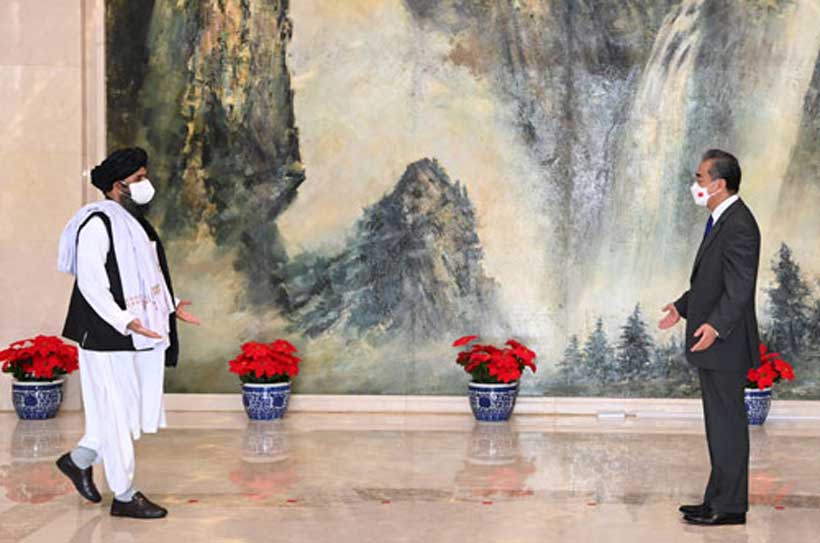
On the last day 28/07/2021, a delegation of key members of the Taliban group, from afghanistan, headed by its co-founder and political committee leader, Mullah Abdul Ghani Baradar, met in Tianjin, and China, with none other than Chancellor Wang Yi to address issues of great sensitivity to the Chinese in the political sphere, economic and security.
It was the first time a “senior” member of the organization had visited China since Sunni radicals captured several key districts in Badakhshan and Kandahar provinces and, according to the news, took control of about half of the country, to the border with the Chinese region of Xinjiang, although for now they control neither the capital nor the government..
Wang said the withdrawal of US and NATO troops from Afghanistan represented a failure of US policies and urged the Taliban to push for a decisive role in the Kabul peace process negotiations. As stated, “the Taliban is a crucial military and political force in Afghanistan and will play an important role in the peace process, reconciliation and reconstruction of the country”, according to the statement from the Chinese Ministry of Foreign Affairs. adding, he claimed that China would support Afghanistan's sovereignty and territorial integrity., but demanded that the Taliban sever any connection with the “East Turkestan Islamic Movement”/ETIM, international terrorist organization listed by the UN Security Council that, as pointed out, “represents a direct threat to China's national security and territorial integrity”.
This process intrigues analysts, because the ceremonial of the meeting and the level of the interlocutors indicate that the Chinese decided to deal directly with the radical group even before the situation in Kabul was defined, since President Ashraf Ghani is still the legitimate constituted commander of the Afghan government. That is, it is an audacious gesture and outside the standards of Beijing's foreign policy of “non-interference in the internal affairs of other countries”, principle she erected as non-negotiable – "to all" – as part of its “one China” policy, even to avoid any interference in issues that are extremely sensitive to him., that is, its non-negotiable sovereignty over Tibet, Taiwan e, now, against the Uighur secessionist movement in the Xinjiang Autonomous Region.
With this, the islamic fundamentalist group, who ruled from 1996 until he was kicked out by the US invasion, in 2001, after Al Qaeda's attack on New York's Twin Towers, took an important step towards consolidating its political and military position in Afghanistan and its recognition by other countries. Its consequences, as I pointed out in previous posts, can be extremely complex for the Afghan population., with the return of severe Sunni orthodoxy, based on "sharia", the islamic law, and to the obscurantism of an Islam dominated by a patriarchy that shallowly interprets the commandments of the Qur'an
The strategic sensitivity of the region is enormous: Afghanistan has none other than Pakistan, China, Iran and the former Soviet republics of Central Asia – Besides, a little farther, the India -, in full dispute, one way or another, by prominence, be thrifty, be political, or even religious (Sunnis x Shiites). By the way, this is the script of what some analysts call “the Afghan tragedy”, since the times of the Silk Road, for it was there that the two great colonial empires of the 19th century – the Russian and the British – fought their “Great Game”. At the beginning of the 21st century, the theme spread mainly after the ascendancy of the People's Republic of China and its commitment to favoring the region along the route of the New Silk Road with which it aims to rewrite the planet's economy. Add to this the entrenched partisan-religious dispute between the Sunni majorities in Pakistan and Afghanistan under the blessings ($$$) of the Wahhabi Sunnis of Saudi Arabia, opposed to the Iranian Shiites, and there we have the scenario for the perfect storm.
This is what Americans/Westerns “miscalculated” when, in the heat of the reproach of the Twin Towers catastrophe, decided to rush into Iraq and Afghanistan, without actually measuring the consequences. And this is the legacy they left behind. The now melancholy “strategic” withdrawal makes room for China, which adds to its historic alliance with the Pakistanis also Taliban Afghanistan. Although the fear of the Chinese is primarily with the expansion of radical Islamic militancy in Xinjiang through the “Whakkan Corridor” – the range of 350 km of common border –, from the political point of view, Beijing aspires to take advantage of the void left by Westerners and occupy more space in the region.
The tragic balance of this adventure, for me, are the thousands of victims, from all sides, who will have died in vain (!), because, after all, the wheel of history returns to the place it was in 2001, and the radical and retrograde militancy takes its place. "and whom at last"…
To be continued…
I suggest to friends to read the article from the “South China Morning Post” below:
